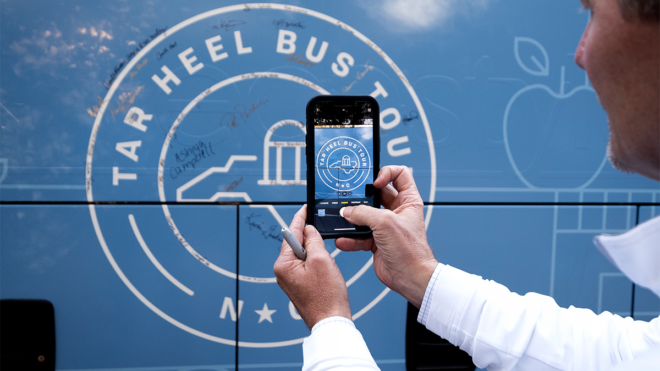One of the many highlights of the fall semester at Carolina occurred in mid-October when 75 Carolina faculty and administrators participated in the 2023 Tar Heel Bus Tour.
Launched in the late 1990s—and continuing in 2019 after a program hiatus—the annual tour sends participants around the state to learn about Carolina partnerships that are impacting local communities and addressing some of the state’s most complex challenges.

Attendees departed from the Chapel Hill campus on separate three-day tours of the state, one in the eastern region and one in the western region. The Graduate School’s Brian Rybarczyk, associate dean for professional development, attended the tour’s eastern trip.
Rybarczyk and other participants traveled to various eastern North Carolina and coastal communities and heard from former and current graduate students and project leaders about the work they are doing to improve lives in those communities. Rybarczyk noted that he developed a better sense of the reach and impact of Carolina as he engaged with people who are on location making a difference.
“The state and the faculty are investing in this research, and our graduates are part of these systems and communities where they can truly affect change,” Rybarczyk said. “On the tour, you realize that this impact is not only coming from work being done in Chapel Hill. It’s coming from them, in these communities.”
The variety and breadth of the work and contributions were evident to all participants. In Wrightsville Beach, attendees learned about the NC Pure Project, which evaluates filtration technologies to remove perfluoroalkyl and polyfluoroalkyl substances (PFAS) from North Carolina waters. Supported by the North Carolina Collaboratory at Carolina, with funding appropriated by the North Carolina General Assembly, the NC Pure team is developing technologies that efficiently remove PFAS from water, including the difficult-to-remove short-chain PFAS such as GenX. Irene Manning, a former UNC graduate student and now lead chemist, presented the work.
Other experiences included visiting the Institute of Marine Sciences in Morehead City, where Carolina graduate students took participants on boats to see their work in action, and stopping in Fayetteville to learn more about research from Carolina public health graduate students on tobacco cessation interventions with military personnel.
The itinerary for the eastern trip included the following stops over three days:
- Raeford – Carolina College Advising Corps: Hoke County High School
- Pembroke – Museum of the Southeastern American Indian and Whole Community Connection
- Pembroke – Air Quality Project
- Whiteville – Border Belt Independent
- Wrightsville Beach – North Carolina Collaboratory
- Morehead City – Institute of Marine Sciences
- Kinston – Kinston Teens, City of Kinston and UNC Development Finance Initiative
- Mount Olive – Wayne County Pathfinders
- Fayetteville – Fort Liberty/UNC Partnerships
- Pittsboro – 79 West Innovation Hub in Mosaic
“The caliber of current and former Carolina graduate students involved in these projects is really amazing,” Rybarczyk said. “By continuing to invest in our graduate students, we are empowering them to be able to make these kinds of social, community, and environmental impacts at a lot of different levels. We are setting up our graduate students for success while supporting community service and outreach, and state service.”
